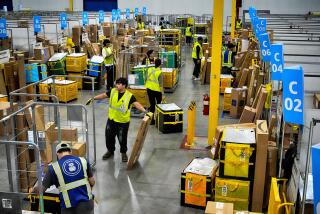Japan Given Ray of Hope on Economy
- Share via
TOKYO — Japan received a rare dose of good news Friday with the announcement that its economy grew by 1.4% in the first quarter, the first expansion in a year.
Any optimism could be short-lived, however, given the fundamental weakness of most of the engine’s underlying cylinders.
“We may have bottomed out, but we’re still not moving ahead,” said Koichi Ono, economist with Daiwa Institute of Research, part of Daiwa Securities.
Japan has the world’s second-largest economy behind America’s, so any sustained growth would boost global prosperity and reduce pressure on the United States.
Even Japan’s government, a notorious cheerleader in interpreting economic data over the last gloomy decade, was careful not to talk up the latest numbers too much.
“The economic situation remains very severe,” Yuzo Kobayashi, vice minister for economic and fiscal policy in the Cabinet Office, told reporters.
Exports did most of the heavy lifting during the quarter, posting a 6.4% increase. Companies such as Toyota, Sony and NEC saw their prospects improve as U.S. and Asian consumers grew more optimistic, opened their wallets and pushed up orders for Japanese electronics and machinery.
But the first growth in Japan’s export sector in six quarters could renew concerns that Japan once again is trying to export its way back to prosperity without doing enough to streamline regulations, encourage entrepreneurs or fix its many internal problems.
Nor are exports the panacea they once were. As Japan’s economy has opened further, it’s moved more factories overseas and relied more on imported components. The result: It no longer gets the boost from outbound trade it once enjoyed.
A second point of strength behind the January-March gross domestic product figure--the sum of all goods and services produced domestically--was consumer spending, which grew by 1.6% on the back of expanded purchases of food, clothes and domestic travel.
Personal spending accounts for nearly 60% of Japan’s economy, and progress in this area is essential for any sustained recovery.
Once again, however, analysts took the news with a large grain of sea salt. “We expected personal spending would be better than this,” said Hiroshi Inagaki, senior economist at Fuji Research Institute. “Furthermore, the figure overstates the real picture because of statistical problems.”
Most consumer surveys here show little joy or confidence among a Japanese population facing ongoing fears of job losses and deflation.
Most Japanese who traveled during the first quarter also stayed close to home because of Sept. 11-related fears, which tends to help GDP. They’re now returning to overseas destinations, however, as the perceived risk diminishes.
And on other fronts, although corporate profits have improved and inventory declined, strategically important business investment fell by 3.2% for its second straight quarterly decline.
Japan’s quarterly growth was 5.7% on an annualized basis compared to 5.6% for the U.S. in its most recent period. That said, there’s a world of difference between the two economies.
Japanese business leaders were quick to point out Friday that the strong quarterly GDP figure doesn’t match what they’re seeing on the ground or what most consumers are feeling. Nobuo Yamaguchi, chairman of the Japan Chamber of Commerce and Industry, termed this disconnect a “gulf.”
Japanese and foreign critics alike repeatedly have called on the government to take all possible steps toward boosting domestic demand, reforming the tax code and otherwise revitalizing the economy.
Few expect that the government can do much in the way of stimulus spending, however, given its poor fiscal condition after a decade of similar attempts.
“We just can’t expect that much,” said Daiwa’s Ono.
Looking further ahead, economists say Japan’s prospects for growth will remain dependent for the foreseeable future on the U.S. economy and currency moves.
In recent weeks the yen has strengthened by about 8%, hurting Japanese exporters. And the Japanese government is forecasting zero growth for the current fiscal year, after a contraction of 1.3% for the fiscal year ended March 2002--the economy’s worst performance since the government started keeping records in 1980.
*
Rie Sasaki in The Times’ Tokyo bureau contributed to this report.
More to Read
Sign up for Essential California
The most important California stories and recommendations in your inbox every morning.
You may occasionally receive promotional content from the Los Angeles Times.













